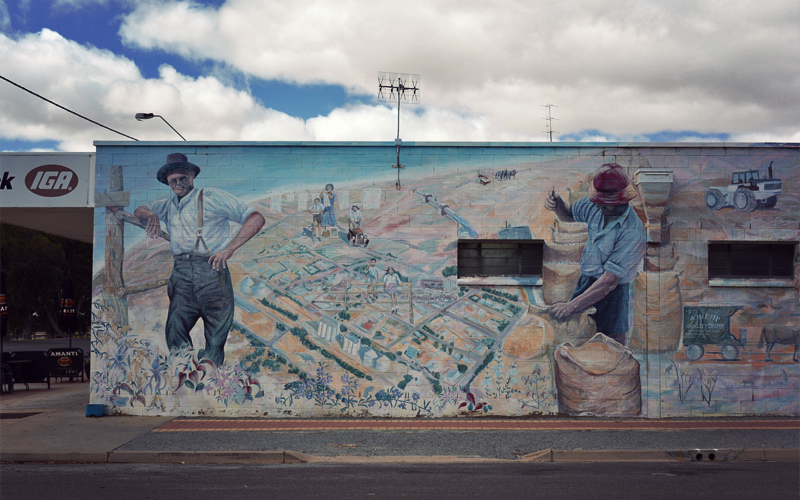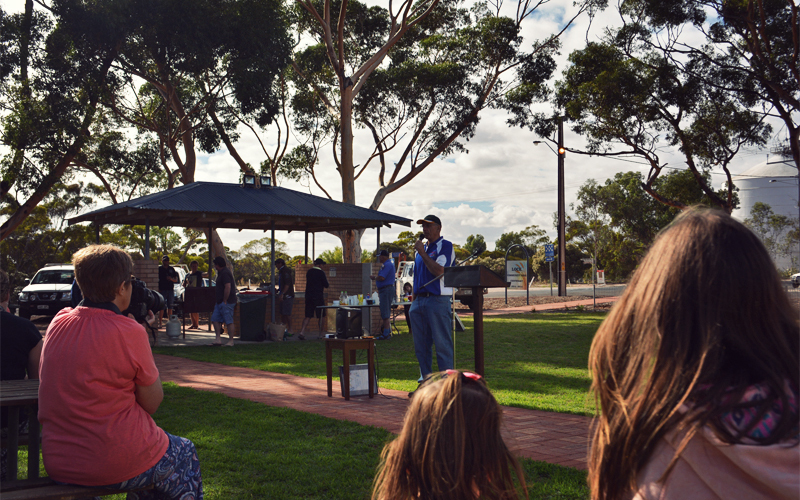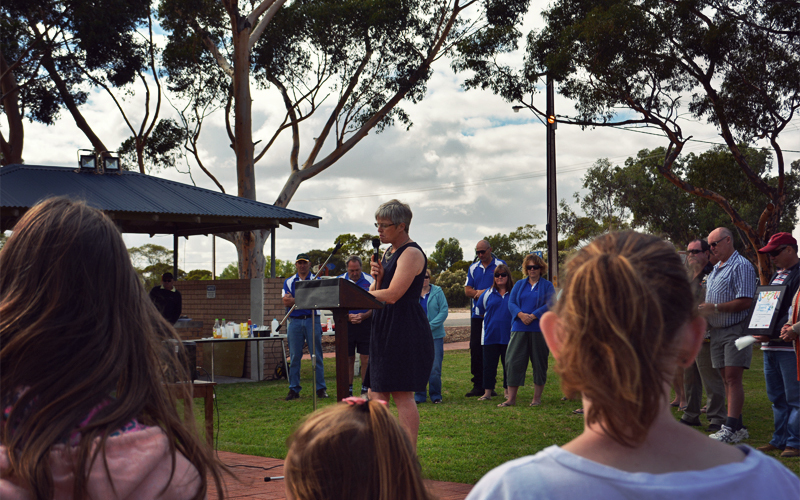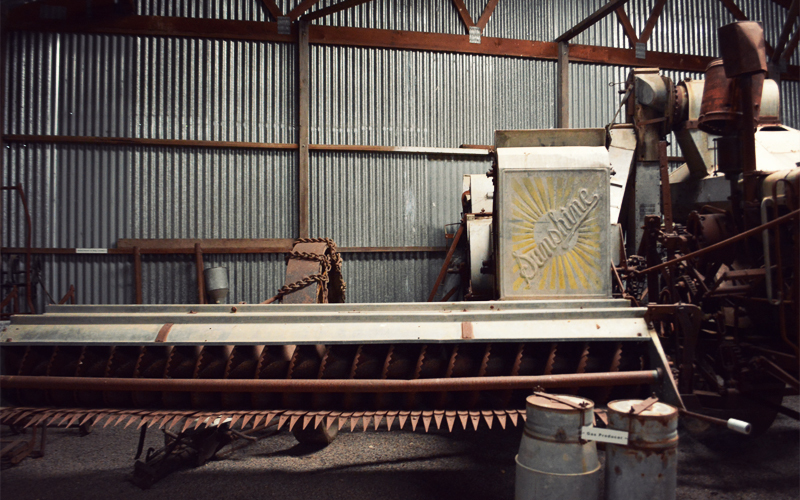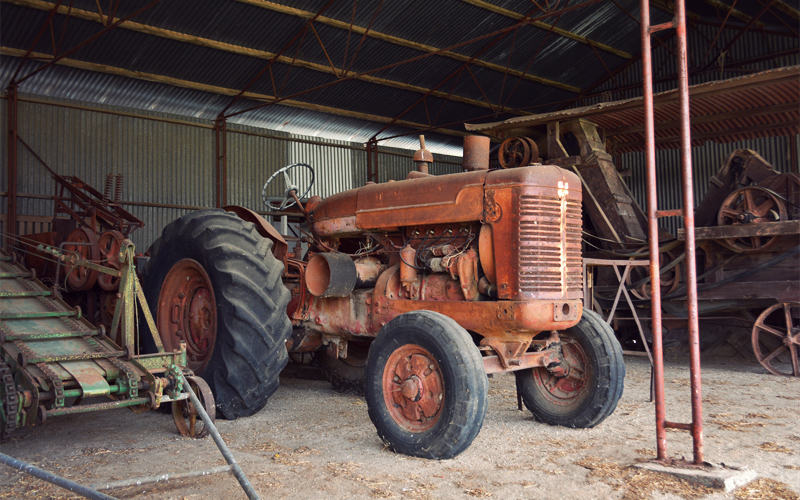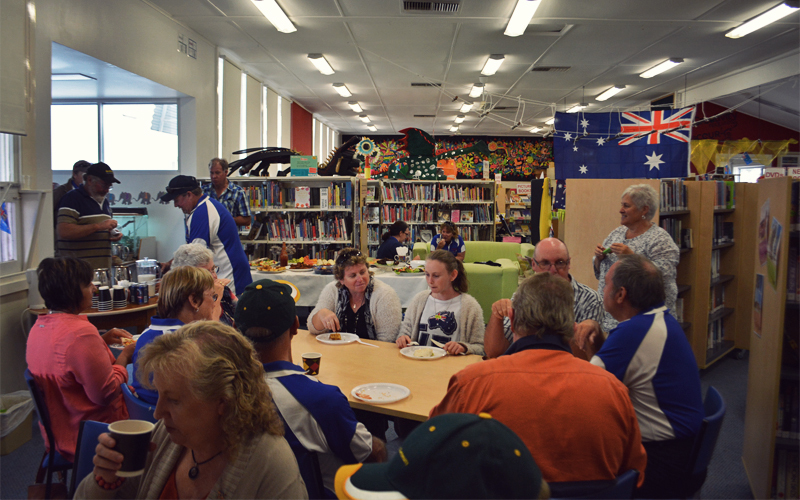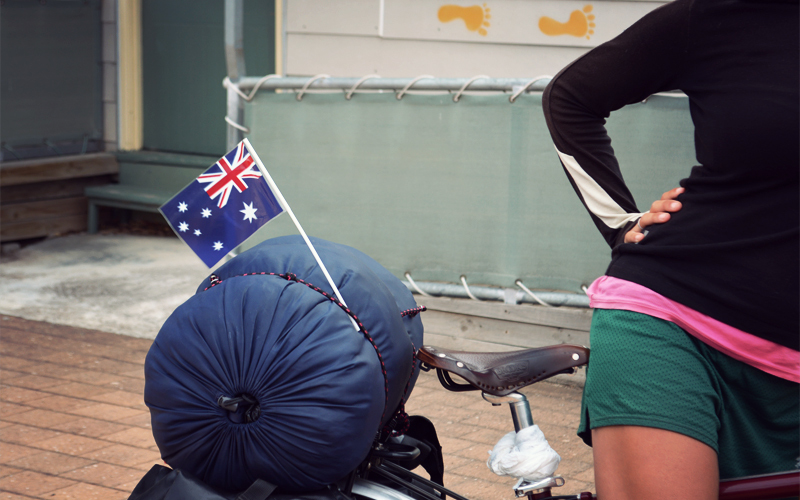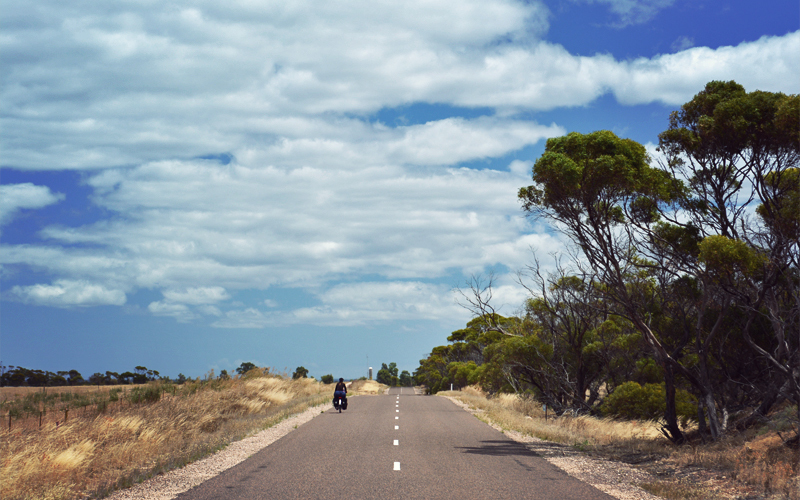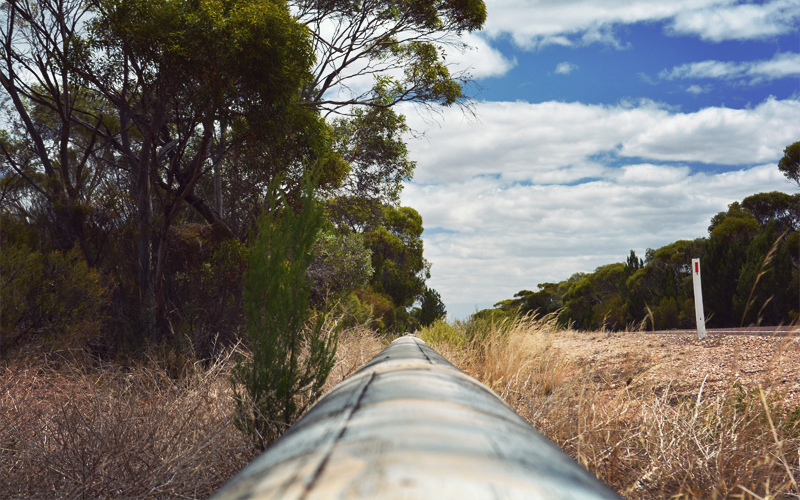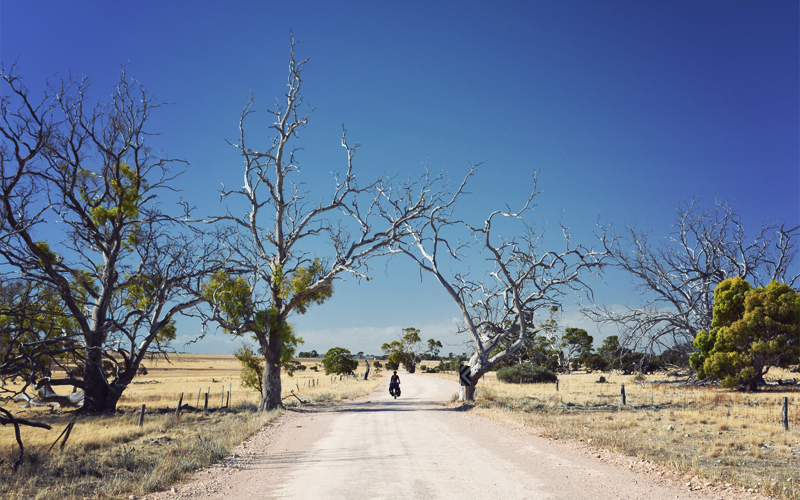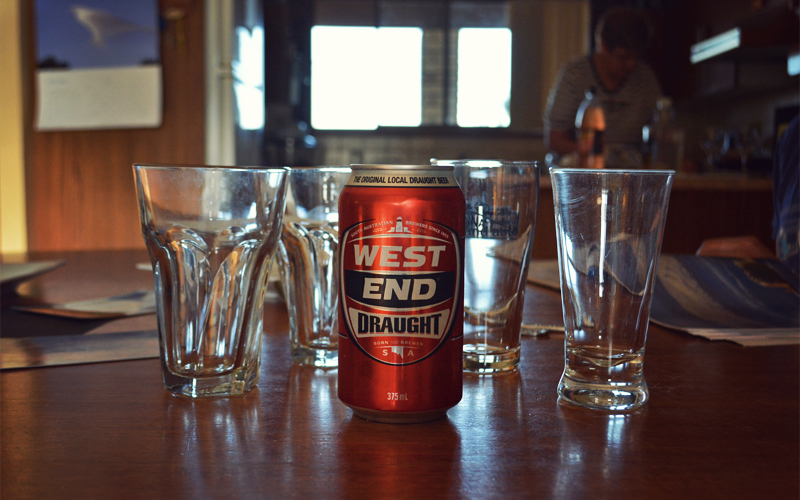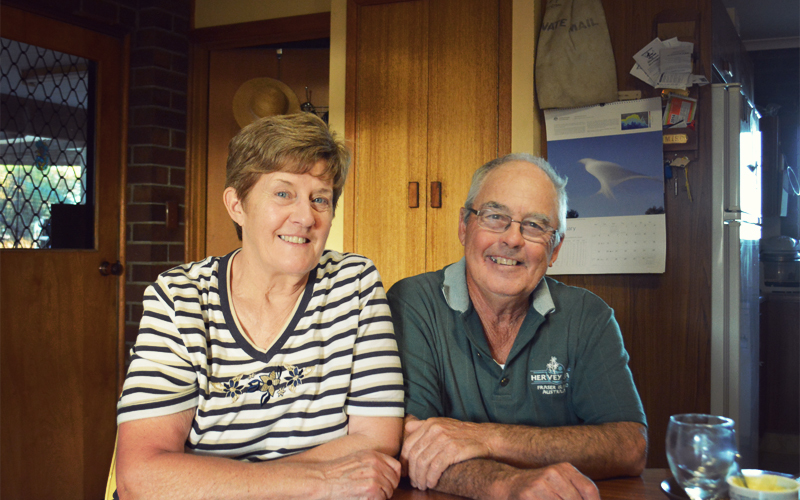January 26, 2015
Day 153: 20 miles west of Rudall, SA to 38 miles west of Lock, SA
The great thing about falling into deep sleep on a cool night in the woods is that you tend not to wake up until you're completely rested. The problem for us this morning is that we don't wake up until 6:45 and don't head back to the road until 7:15. That leaves only about an hour to ride from our quiet spot in the middle of nothing into the town of Lock in time for a breakfast that we so badly need. Adding to the challenge is that Kristen puked several times late last night, which means that everything she ate for dinner ended up on the forest floor instead of giving her the strength to crank hard toward a breakfast that because of said puking is now even more important as far as food goes.

| Heart | 0 | Comment | 0 | Link |
Red-orange foxes flash across the road in front of me, leaping off the other side and into the bush as they cross from one huge wheat field to the next, and this is the long and the short of the excitement that waits for us on the Birdseye Highway this morning. Mostly we pedal without stopping and do what we can to try and ignore the creaking in our stomachs and the dull ache that starts to form in our heads.
With light winds and gentle terrain we make it the thirteen miles to Lock in just over an hour. It turns out that trying to reach an almost-closed grocery store or outrun a major thunderstorm will make us pedal a little harder, while the promise of a large and possibly free breakfast causes us to find gears and a level of refined cycling focus I never knew either of us had. We arrive to find the streets of the town all but empty because everyone is instead at the town park, which is surrounded by utes and SUVs parked at odd angles in unordered rows around its edges and has the comforting smell of bacon rising up from the covered barbecue area at its center.
As we lean our bikes against a tree near a far corner of the park, we look out on a patch of grass and picnic tables and a couple of covered pavilions that's a little bigger than an acre. Behind the grill are the community's young guys, the kind of guys that are big and tough and generally short on words that play Aussie rules football on the weekend, talk a lot of shit, and drink a lot of beer. Today they're already talking shit and already flying through a rack of West End beer and it's just 8:30 in the morning. Beyond we see five- and six-year-old girls in flower-print dresses with little Australian flags in their hands chasing each other around and screaming out in delight. In between, a wandering line of people snakes away from the piles of bacon and eggs and toast that sit on greasy paper plates on a single white plastic folding table.
Most of the parents and grandparents have splintered apart into groups of four to six and stand around in tight circles and half-circles. But a few of the people who haven't yet found a crowd to fall into notice us walking into the park looking kind of confused and unsure, and so they walk up to welcome us to Lock and to their Australia Day celebration. At first they express varying degrees of interest, excitement, and disbelief when they find out where we're from and how far we've traveled to reach their town. And then, without fail, each one tells us how it's never this cold here on Australia Day, that they can't believe it's this cold, that they're sorry it's this cold, that it's usually bloody hot around here at this time of the summer, in the way that if you live in a small farming community you're required to talk about the weather with great detail and interest more or less at all times. As we fall into the breakfast line and soon stack piles of meat and bread on our plates, we learn that some of the people attending the event drove from more than fifty miles away. It's a revealing fact; it shows that even though the towns out here might be small, the sense of community that exists in the broader region around them runs strong and deep.
We talk with half a dozen other people while we eat breakfast and wait for the public speaking part of the event to get underway. At one point, the guy who seems to be in charge of running the thing comes over. He asks who we are, where we're from, and when he learns about our ridiculous cycling story he wants to know if he can mention us in his speech. We tell him that yes, of course he can, and that we're so thankful to have ended up in such a wonderful place. We mean it without the slightest hint of brown-nosing.
Moments later the program gets underway. The man we just talked to welcomes everyone to Australia Day.
Mild clapping.
He leads all of us in the singing of the Australian national anthem, which it turns out is far shorter and much easier to sing than the one we've got back in America.
Edging toward enthusiastic clapping.
He starts into reading from the list of honored guests printed on the event program. First he recognizes the District Council president.
Back to just mild clapping.
He introduces a woman from Adelaide who was named some kind of ambassador by the National Australia Day Council and has traveled out to Lock to give what we can only imagine is meant to be an inspiring, patriotic speech.
Mild clapping.
"And finally," he says. "I'd like to welcome Kristen Waddell and Jeff Arnim, who have come here on push bikes all the way from Portland, Ontario ... no, wait, Portland, Oregon, that's right ... in the United States."
Furious applause.
It's a surreal moment, something we never could have expected or even conceived of. All we can do is sit back, give a quick wave to the crowd, and smile half out of joy and half because we're amazed and humbled and appreciative of having been welcomed by a group of people who only fifteen minutes earlier had no idea we existed.
A guy named Kingsley is presented with the 2014 Citizen of the Year award in honor of his involvement in so many committees and events and working groups that it takes more than two minutes for the host to read through the entire list. And yet we can tell that he does all of these things not for attention or notoriety or some other selfish purpose, but because he cares about his community and because he believes that putting in the time and energy to help the town prosper are the right things to do. During his brief acceptance speech he recalls in quiet tones at a slow and measured pace the phone call where he was told that he had won the award.
"'Are you sitting down?' he asked me. And the first thing I thought was, 'What the bloody hell happened to the swimming pool now?' But then he said, 'No, no, you've been chosen for the Citizen of the Year.' And I paused for a moment, and then I said to him, 'Who the hell would nominate me?'"
He's just that kind of guy.
The town also honors its Centenary Committee. Lock turned a hundred years old just last year, because up until only a century ago it wasn't possible for it to exist. There aren't any natural water sources out in this part of the Eyre Peninsula, and it wasn't until water was piped up from Port Lincoln in the 1910s that wheat and sheep and the communities that support them were able to come into being.
Throughout everything a small brown and white dog walks around among the chairs and benches and tables, sniffing everyone's ankles, accepting pats on the head, and looking for scraps of bacon and eggs.
The generosity bestowed on us by the people of Lock goes on and on. We're about ready to stand up from our chairs and head back to the road when someone says that because we're now honored Australia Day guests we're invited to go look at the town's museum, which is normally closed. After that we can head to the library for a lunch and reception that's being held for those same honored guests. In the hundred feet that stand between our chairs and the tree where our bikes have been leaning all morning we say thanks and goodbye to at least a dozen people. When we reach the bikes we're immediately interviewed by a writer from the local newspaper and then have our picture taken by a pair of local photographers. They turn out to be Dianne and Ian, who run a sheep and wheat farm in the area, and who within two minutes of introducing themselves offer us dinner and a place to stay for the night in between Lock and Elliston, the next town that lies to the west.
It takes all of a block and a half of riding to reach the museum. It's a small house that used to be the police station. Talking to a couple of the town's long-time residents inside, we learn about how the population of the town continues to shrink as farms grow larger and more automated. Where twenty or thirty years ago a thousand people lived in Lock, now it's more like 300. We also learn that children go to school in town only through the American equivalent of tenth grade. To continue their education after that they have to attend a school in another town or city. But because of the relative isolation of Lock, there isn't another one close enough to drive to and from every day, so they have to go to a boarding school instead. Behind the house sit sheds full of old farm equipment — utes, tractors, harvesters, hundreds of pieces of hand tools — that reveal what life looked like out here when automation was only beginning to take hold.
We head into the library half an hour later, where we dive into our second big meal of the day, and where we talk with still more farmers and teachers and retired people who live in the district. It's a festive place to be, with people smiling and talking and laughing out loud as they power through meatballs and salads and Lamingtons and talk in equal parts about farming and their children and local politics. I never thought I'd see people drinking beer in the middle of a library attached to a school, but then again I never thought I'd end up in a town like Lock on a day like this. There are a few non sequiturs, like when we overhear the woman who sits at a nearby table talking about how if immigrants aren't willing to integrate into the accepted norms and traditions of Australia that they can leave and go back where they came from. The heavy irony that she says this on Australia Day, the day where the country more or less said Sorry native people, I know you've been here for 60,000 years and we've only been around for like eight days, but we're taking all of this for ourselves, is not lost on us.
But the heart of Lock is good. It's the kind of place where the guys grilling and drinking beer, who everyone calls the lads, work as a group to help people in the community when they need some extra labor. They do this in exchange for beer or for nothing at all, just because they know that their efforts make a difference. It's a small town and it's getting smaller, but the people who still live here care about the place. Even though we only spend a few hours around them it's clear that they're committed to making sure it remains a healthy, thriving community. Every farmer we meet is proud of what they do, of how hard they work, and of how they're part of a tradition that dates back more than a century and forms the core around which all of country life is based. Knowing all of this, it's both a surprise and no surprise at all that as we walk toward the door to leave the librarian says goodbye to us by name, thanks us for being a part of Australia Day, and wishes us safe travels. (A few days later we were also mentioned in an article about the event published in the local newspaper, the Eyre Peninsula Tribune.)
The importance of the community is further put into perspective when we head west out of town in the early afternoon. As soon as the grain elevators disappear behind us we're out in the middle of what feels like nothing, with fields of wheat sprawling in every direction and farm houses appearing only every few miles, and far off into the distance when they do. Back in Lock I was talking to a guy who does wheat and sheep farming, and at one point in the conversation he mentioned his neighbors. When I asked how close they lived to him, he thought about it for a second and said, "Not far. Maybe five or six k's". And as the farms get bigger, those neighbors move farther and farther away. It means that if the community events and the involvement in things like the swimming pool and the school and the oval were to go away there'd be nothing left to keep the people who live out here connected. The land is simply too vast.
There's still almost no one to pass us on these remote country roads, and after the breakfast and lunch back in town we now know half of the people who drive by us with a wave or a honk or both. The farther we go the more rocks start to appear on the fields, which coincides with the disappearance of wheat and the return of grazing land for sheep. As our tailwind shifts into a heavy headwind, we ride surrounded by a world where kegs with the tops remove turned have been turned into mailboxes, inside of which sits a big rock that's used to keep the letters from blowing away on the days when the wind comes down from the north.
In the early evening we reach Dianne and Ian's home, and within an hour we sit down to dinner with the two of them. Over potatoes and vegetables and two types of meat we learn how Dianne's family were among the first settlers on the Eyre Peninsula, arriving as a group of fourteen in Port Augusta in 1838 after leaving England behind. They've been here ever since. Ian's family hasn't been in the area quite as long, but he's lived on a farm since the day he was born and if it's up to him I suspect he'll live on a farm until the day he dies. He and Dianne have known each other since high school and they've been married for more than forty years. Their son works on the farm. Ian is one of the leaders of the rural fire brigade and has served on the District Council. Dianne runs the library at the nearby school. Life on the peninsula is the only thing that each of them know; it's an inseparable part of their identity, in a way that no one who grows up and works in a city or suburb could ever imagine.
After dinner Ian takes us for a ride in his SUV and shows us around the many hundreds of acres of farm his family owns, telling us all the while about the character of his sheep herd, his passion for farm equipment, and his frustration with the farm laborers of today who don't care all that much about working hard. He also points out the yawning mouths of the wombat holes that dot the property, but we're too early in the evening to see any animals poking their heads out. The overriding feelings we get from Ian, and that we get from so many of the Australian farmers that we've met since setting out from Sydney, are intense pride in the land, pride in how it's managed, and pride in how he's been going about his work as a farmer for almost fifty years. It's not just his job, it's his purpose.
As we collapse into bed, all we can do is shake our heads and laugh and crack a little smile. Only fourteen hours earlier we were laying in our tent in the bush, tired, a little sick, hungry, and unsure of whether we'd wobble through the day on empty stomachs with headaches following alongside us all the way. Instead we ended up with three full meals, an uncountable number of well wishes and words of support, and an Australia Day full of stories and memories and good feelings that we'll remember for the rest of our lives.
Today's ride: 52 miles (84 km)
Total: 5,094 miles (8,198 km)
| Rate this entry's writing | Heart | 3 |
| Comment on this entry | Comment | 0 |
